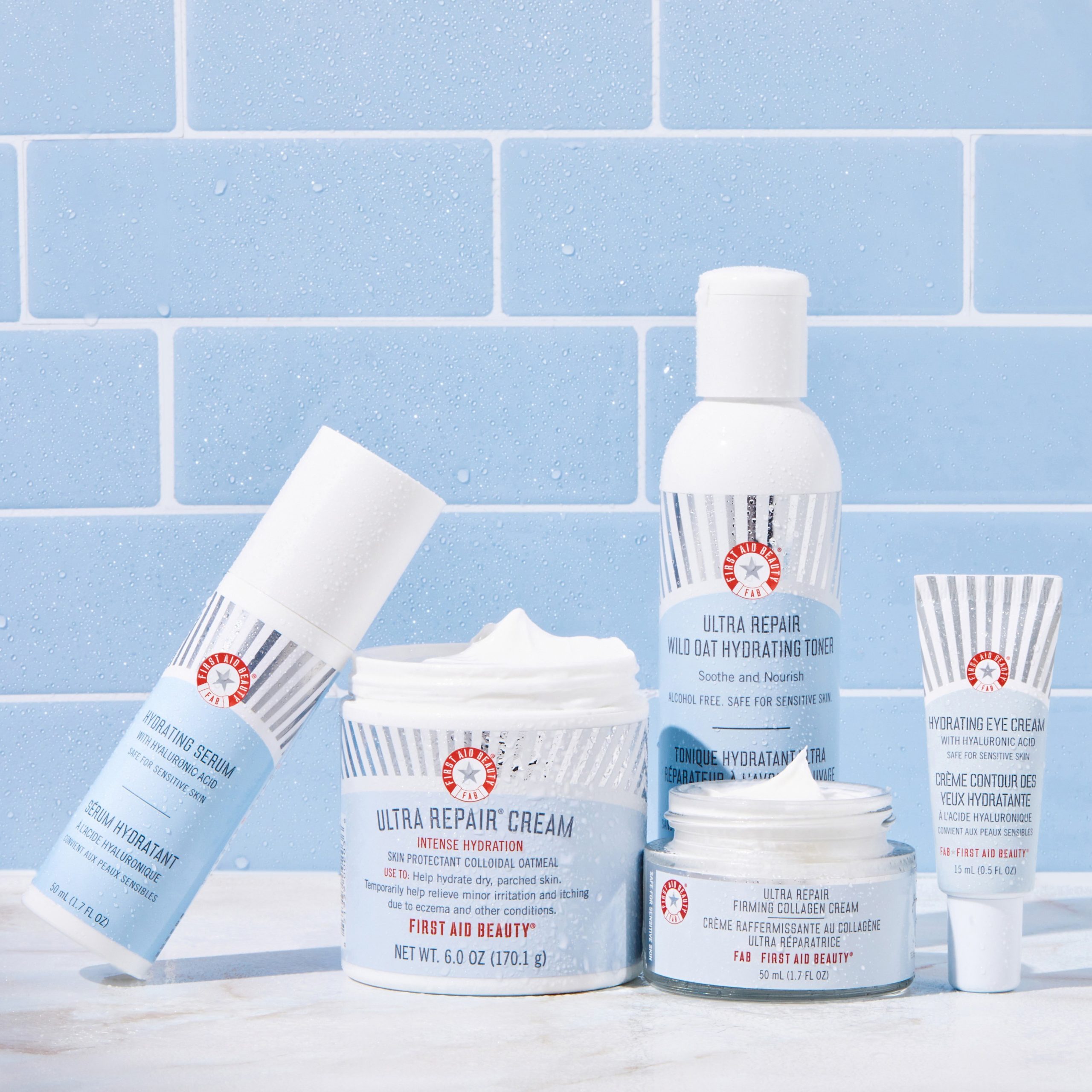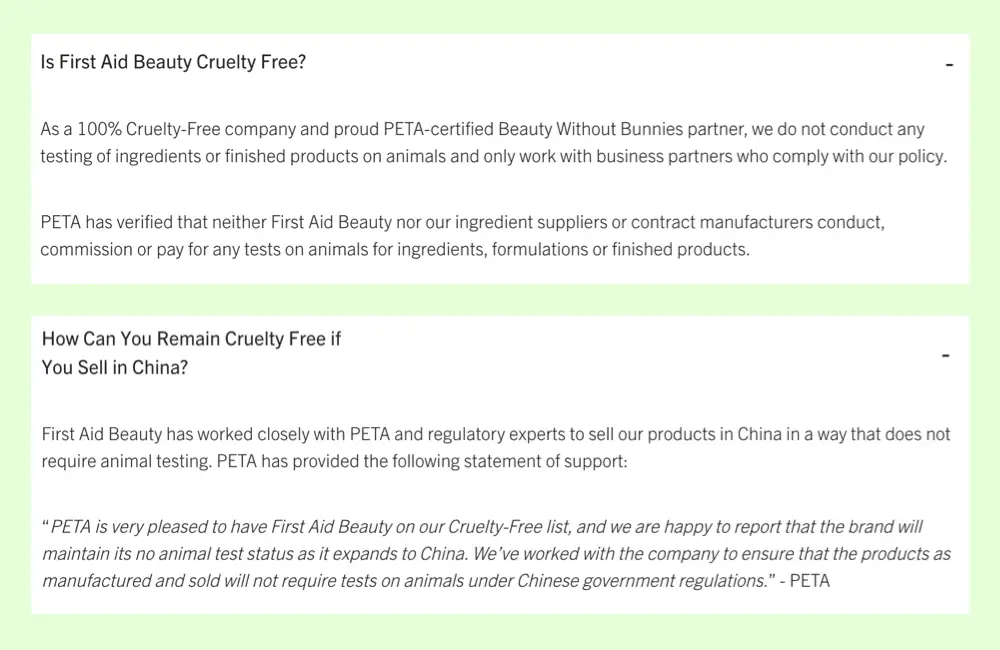First Aid Beauty claims to be proudly cruelty-free, but they recently made some questionable distribution decisions that leave us skeptical.
First Aid Beauty is not cruelty-free. It distributes its cosmetics where animal testing is required by law. While First Aid Beauty may have products that are free of animal-derived ingredients, it is not considered a vegan brand.
Let’s start with the good news:
First Aid Beauty is about bringing consumers effective and accessible medical-grade skincare products. Beyond anti-aging, it focuses on helping those with conditions like eczema, dermatitis, acne, and more.
Now for the bad news:
First Aid Beauty took a turn for the worse in 2020 when the brand began distributing to China.
It claims to still be cruelty-free (with PETA accreditation to back it, may we add). But it’s near impossible to sell international products in China without the risk of post-market testing.
Here are the hard facts to consider about First Aid Beauty before you make your next purchase.
Is First Aid Beauty Cruelty-Free and Vegan?
First Aid Beauty is Not Cruelty-Free
Test any of its products or ingredients on animals
NO
Purchase any ingredients tested on animals within its supply chain
No
Distribute its products to any countries that require animal testing by law.
Yes
First Aid Beauty is in a complicated grey area here. It does have PETA certification, but it chooses to distribute and sell its products in mainland China.
According to the brand – it maintains its cruelty-free status by producing products domestically. This voids it of any pre-market testing.
It’s a reasonably new loophole in China’s notorious animal testing laws. While it may seem great – it doesn’t guarantee that post-market testing won’t be done.
Do you see the problem?
First Aid Beauty was also bought by Procter & Gamble in 2018, which is not cruelty-free as they allow animal testing when required by law.
This brings us to the next point:
First Aid Beauty is Not Vegan
Although First Aid Beauty has products free of animal-derived ingredients, it’s hard to consider them “vegan” since they’re not 100% cruelty-free.
The only animal-derived ingredients it claims to use are honey, beeswax, and collagen.
Animal Testing Policy and History
First Aid Beauty claims to be against animal testing of any sort.
BUT (and it’s a big one), the brand announced it would begin selling products to mainland China in 2020, and it would somehow remain cruelty-free. But it really is not.
What’s also concerning is that it remains cruelty-free certified. So who can we trust?
Cruelty-Free Status in 2022
Here is a screenshot of First Aid Beauty's official statement regarding its cruelty-free policies and vegan products, taken from its website:
Do we have issues with this statement?
Just one or two.
First Aid Beauty's Certification
First Aid Beauty is PETA certified.
But in this case – it’s not enough.
While you might know PETA very well – it surprisingly doesn't hold the strictest cruelty-free regulations. It seems only to require a brand's written consent that abides by the PETA code of conduct.
Certification from Leaping Bunny is ideal because it holds rigorous standards and does regular audits to ensure they are upheld. It ensures that:
The fact that PETA allows certain brands to distribute in China even though they might be subject to post-market testing is a highly questionable decision.
Is First Aid Beauty Sold Where Animal Testing is Required By Law?
Yes, First Aid Beauty distributes its products in China.
According to the brand – it maintains its cruelty-free status by producing products domestically. This voids it of any pre-market testing.
The loophole First Aid Beauty is using is new unexplored territory for many brands wanting to distribute to China.
It believes to be in the green zone since it domestically manufactures its products in China, which eliminates the risk of pre-market testing.
I.e., no products are tested on animals at the country’s borders since they were manufactured locally.
First Aid Beauty conveniently fails to mention that it is still at risk for post-market testing. A product can still be pulled off the shelf and tested on animals for quality control or if a customer complains.
This makes it impossible to guarantee that First Aid Beauty is actually 100% cruelty-free.
While they can technically recall a product before any testing happens – will they actually do it? And if they don’t, will we ever hear that it happened?
If you live in China or are concerned about its cruel beauty policies, there are a few ways to get cruelty-free products safely delivered to your house. Here’s how. Are Cosmetics Made in China Cruelty-Free?
What First Aid Beauty Products Are Vegan?
First Aid Beauty does offer products that are free of animal-derived ingredients. However, it’s difficult to consider anything holistically vegan when it’s not cruelty-free anymore.
However, it clearly labels its “vegan” products on its website. So, if you want to keep using its products at this stage, you can always check the item description!
To save you some time, here are some of First Aid Beauty’s most popular products to choose from:
Unfortunately, First Aid Beauty does not have a dedicated page for its vegan products.
But a quick scroll through its website’s product pages will help determine if something is vegan.
Vegan Alternatives to First Aid Beauty
There aren’t many easily accessible skincare brands with vegan-friendly products that treat skin conditions like eczema.
This makes First Aid Beauty an obvious choice for those still wanting to get their hands on a more ethical product.
But if you are vegan and a strong advocate of 100% cruelty-free skincare, then First Aid Beauty won’t be the best option.
Instead, here are some great vegan and cruelty-free options that will have your skincare needs in mind.
Brand | price range | 100% vegan | Certification |
|---|---|---|---|
$10 - $30 | Yes | Leaping Bunny | |
$20 - $50 | Yes | Leaping Bunny | |
$30 - $80 | Yes | PETA, Leaping Bunny | |
$5 - $20 | Yes | Leaping Bunny | |
$20 - $70 | Yes | PETA, Leaping Bunny |
Is First Aid Beauty Natural and Organic?
First Aid Beauty isn’t considered natural or organic, and it doesn’t claim to be.
While it does some star natural ingredients, its focus has always been on creating clean and safe products for those with sensitive skin. It has products that anyone can use – giving you maximum results with minimum irritancy.
If a synthetic ingredient is "clean," it means it is safe and non-toxic for us. Its purpose is to preserve the stability of a beauty formulation.
Does First Aid Beauty Use Safe Ingredients?
According to Skin Safe, First Aid Beauty has an 82 – 100% allergen-free ranking for each product.
First Aid Beauty also includes a list of ingredients each product is ‘free from’ for each product on its website.
While it is not 100% hypoallergenic or non-comedogenic, it caters to these specific concerns, so make sure you buy what your skin needs.
The EU/UK Have Stricter Ingredient Regulations
We don’t want to scare you, but you HAVE to read up on any product’s ingredient list before you make a purchase – especially if you live within the United States. The reason why will shock you.
The FDA has only banned or restricted 11 harmful chemicals from cosmetics within the country. Europe and the UK, on the other hand, have banned 1,328!
First Aid Beauty sets a great example of what true clean beauty is meant to be, so this is an area you don’t have to worry about.
In general, you want to avoid the following skincare ingredients:
Are Cruelty-Free Ingredients Safe?
There is no reason why cruelty-free products shouldn’t be as safe as anything tested on animals.
Not only is it easy to test ingredients without using animals altogether, but there are so many pre-approved ingredients you can use to make cosmetics that there is no need.
If you’re interested, here’s more on the subject: Are Cruelty-Free Cosmetics Safe?
Is First Aid Beauty Sustainable and Ethical?
First Aid Beauty doesn’t seem to be doing much in the sustainability department.
If it does have sustainable or environmental initiatives on the go – it isn’t sharing it with the public!
Luckily it has done some ethical groundwork. First Aid Beauty launched FAB AID in 2020 – a student debt relief initiative where the brand made a $1 million commitment.
Every year the FAB advisory board will select winners to have up to $35,000 of their undergraduate loan balance paid off.
Final Thoughts
First Aid Beauty has made a well-deserved name for itself over the years. It can be challenging to find effective and accessible medical-grade skincare, but they have managed to do it.
Of course, First Aid Beauty is not 100% vegan (with no plans to change that), so it’s not the best choice for activists who go the extra mile.
And while they have now insisted on selling products in mainland China through a loophole, going directly against their cruelty-free policies, it doesn’t make them an evil brand that can’t be trusted (it is disappointing though).
As time goes on, we will better understand this grey area of animal testing laws and what exactly to expect from these brands trying to use these loopholes.
In the meantime, we need to keep an eye on how it progresses and as consumers speak up about the things that we will not tolerate.


